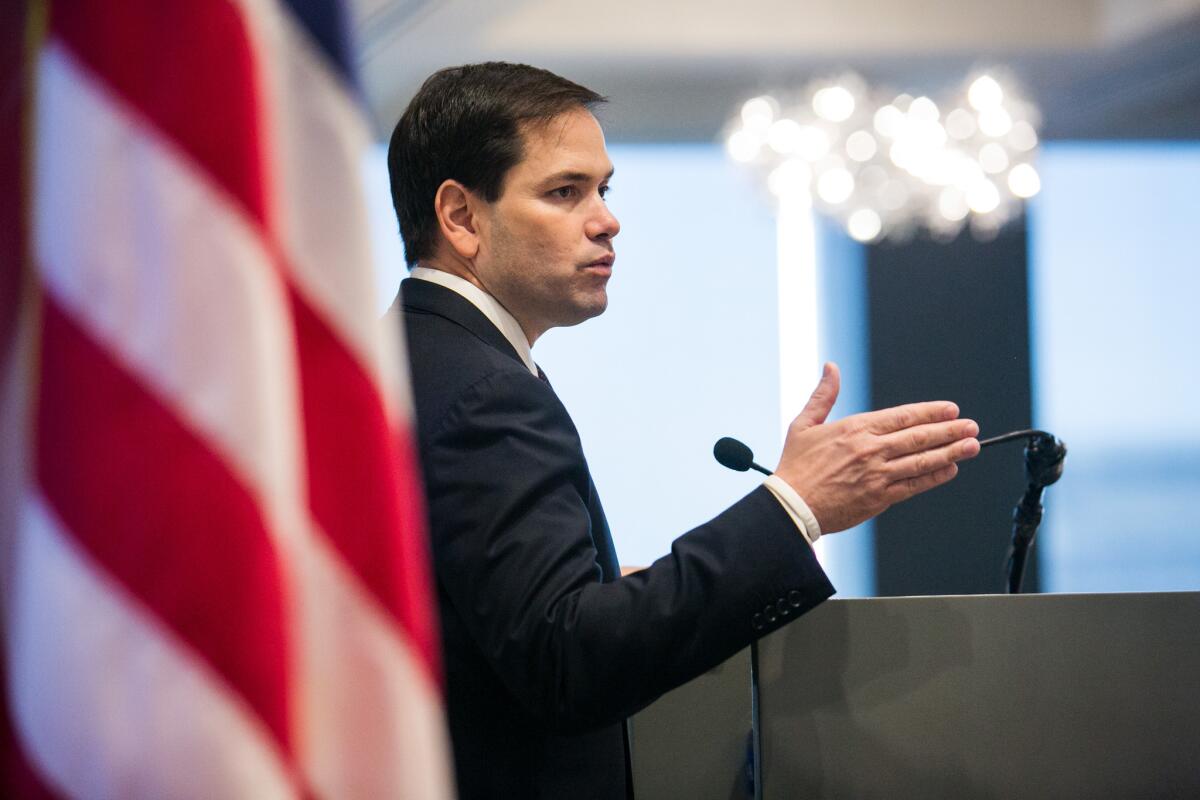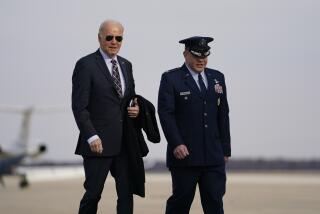Sen. Marco Rubio takes on Japanese prime minister over ‘comfort women’

Republican presidential hopeful Sen. Marco Rubio (R-Fla.) speaks at an event organized by Town Hall Los Angeles on April 28.
- Share via
Speaking on the eve of Japanese Prime Minister Shinzo Abe’s address to Congress, Republican presidential candidate Marco Rubio on Tuesday called on Abe to fully acknowledge his nation’s role in forcing women from Korea and other Asian nations into sexual servitude for Japanese troops during World War II.
Abe has expressed regret for wartime atrocities, but the Florida senator said his statements have not “gone far enough” for the victims and have created a wedge between South Korea and Japan that is being exploited by the Chinese.
“For the interest of geopolitical stability, not to mention for historical accuracy, I think it’s important for the government of Japan to be more forward-leaning in the pronouncements they’re making, and I hope the prime minister will do that tomorrow when he addresses a joint session of Congress,” Rubio said in response to a question at a Town Hall Los Angeles luncheon.
The afternoon gathering, at the 51st-floor City Club in downtown Los Angeles, was Rubio’s sole public event during a two-day California trip. The first-term senator also held private meetings with donors.
The accounts of the victims, known as “comfort women,” are accepted as historical fact, but some Japanese nationalists challenge their accuracy. The resulting schism between South Korea and Japan has had reverberations around the globe. In Southern California, which has a large Korean population, the placement of a memorial to the women in a Glendale park led to protests and a court battle.
The issue of Japan’s wartime acts has come under increased scrutiny as the Asian nation prepares to take a greater role in security in the region, the first flexing of its military muscle since World War II. It also has arisen during Abe’s trip to Washington.
In a White House Rose Garden news conference Tuesday, before a state dinner in his honor, Abe was asked whether he would apologize for his nation’s actions during the war, including the enslavement of as many as 200,000 women.
The prime minister said he was “deeply pained” thinking about the women, but did not apologize. Abe said his administration stood by the 1993 Kono Statement, which acknowledged the imperial military’s involvement in creating “comfort stations,” and that some women were coerced or held against their will. Abe also noted that women have long suffered when nations are in conflict.
“Throughout the history of the 20th century, women’s dignity and basic human rights had often been infringed upon during wars. We intend to make the 21st century a world with no human rights violations against women,” Abe said, adding that Japan is contributing $34 million over two years to efforts aimed at eliminating sexual violence against women during conflicts.
Aside from the response to the question about comfort women, the rest of Rubio’s remarks in Los Angeles largely aligned with the broad strokes of his campaign stump speech, delivered repeatedly since he announced he would run for the White House earlier this month.
He outlined his history as the child of working-class Cuban refugees who achieved the American dream.
He warned that the nation is at a crossroads, and said it must take certain steps to ensure that its prominence in the world does not fade. Rubio called for tax and regulatory reductions, improving career readiness among high school graduates and reforming Social Security and Medicare.
Without mentioning President Obama by name, Rubio slashed at his leadership. He also criticized politicians he said were stuck in the 20th century — a line commonly taken as a slight against likely GOP rival Jeb Bush and Democratic frontrunner Hillary Rodham Clinton.
“We cannot embrace this future led by people trapped in yesterday,” Rubio said.
Follow @LATSeema for political news.
More to Read
Get the L.A. Times Politics newsletter
Deeply reported insights into legislation, politics and policy from Sacramento, Washington and beyond. In your inbox twice per week.
You may occasionally receive promotional content from the Los Angeles Times.











